White and fluffy death. How Uzbekistan and Kazakhstan help Russians produce gunpowder
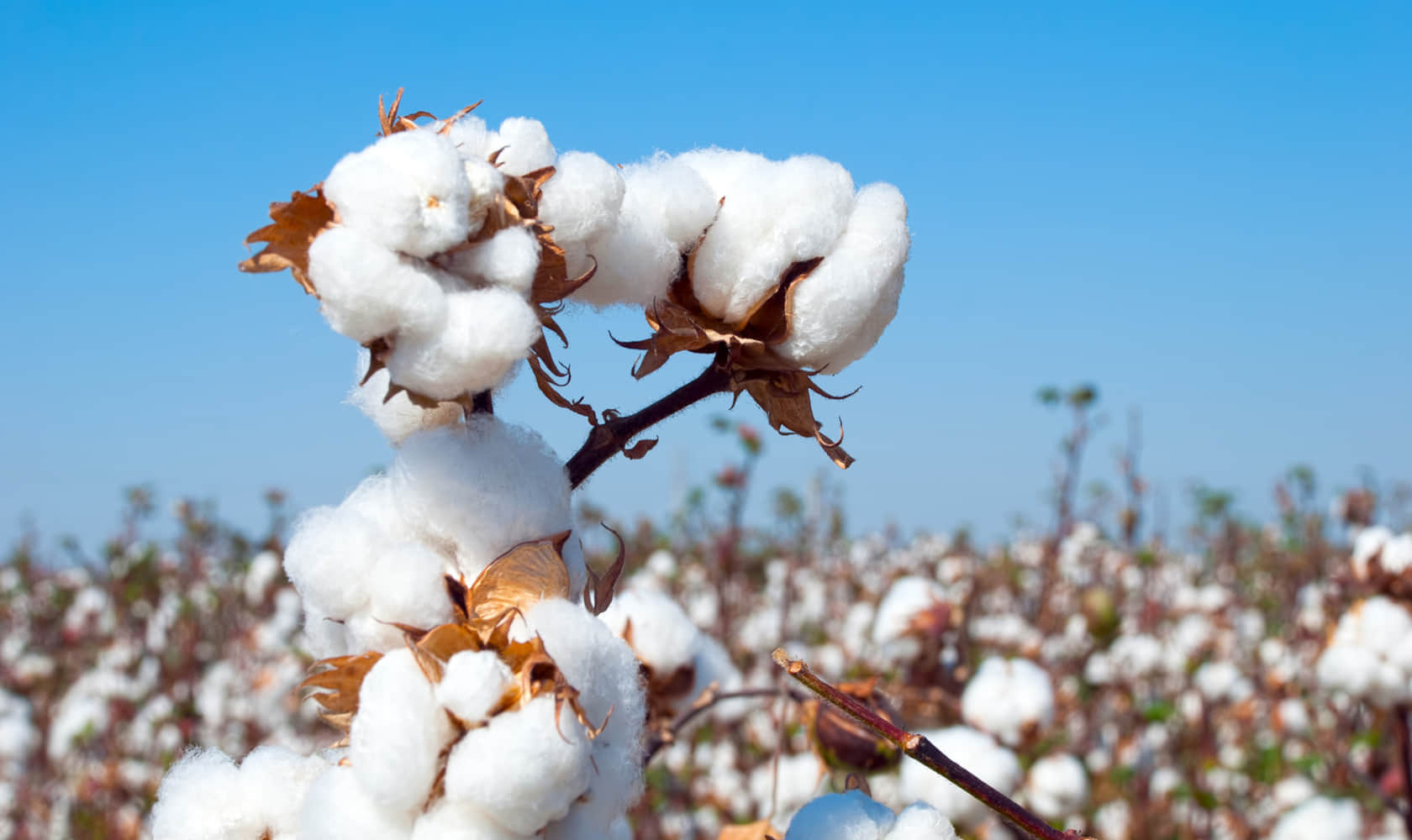
Uzbekistan and Kazakhstan have increased sales of cotton and its derivatives to Russia, which are used to produce gunpowder and explosives. How are the producers of these countries involved in the destruction of Ukrainians?
In the so-called noughties, the world media was outraged by the systematic use of child labor during the cotton harvest in Uzbekistan. In a decade and a half, this practice was eradicated, and then, it would seem, everyone forgot about this branch of agriculture and even about the country.
However, at the end of 2023, the cotton industry reminded of itself again. A new scandal arose because of the cooperation of Uzbek and Kazakh exporters with sanctioned Russian factories that produce explosives for weapons. These companies are helping the Kremlin wage war against Ukraine.
Officially, Kazakhstan and Uzbekistan remain neutral in the Russian-Ukrainian war, but statistics show a different position. After February 24, 2022, these countries significantly increased their exports to Russia of cotton pulp and nitrocellulose made from it, key components for the manufacture of explosives and gunpowder.
According to the Organized Crime and Corruption Reporting Project (OCCRP), Vlast, and iStories, 98% of Russia's cotton pulp comes from Kazakhstan and Uzbekistan. The latter ranks fourth in the world in terms of its exports.
"Neutral" positions
Despite their officially neutral stance, Kazakhstan and Uzbekistan supported the sanctions decisions of Washington and Brussels regarding cooperation with Russian companies involved in the war against Ukraine. Moreover, their representatives promised the US and the EU to help fight sanctions violators.
Instead, however, both governments tried to circumvent the restrictions imposed on Russia and helped the Kremlin obtain raw materials for the manufacture of gunpowder and explosives. The growth rate of this assistance is impressive.
According to the UN Comtrade database, in 2021, Kazakhstan and Uzbekistan shipped $4 million worth of cotton pulp to Russia. In 2022, the first year of the great war, this figure increased by 150% to $10 million. In the first nine months of 2023, Uzbekistan alone exported $9 million worth of cotton and pulp to Russia, meaning that the annual volume could be a quarter higher.
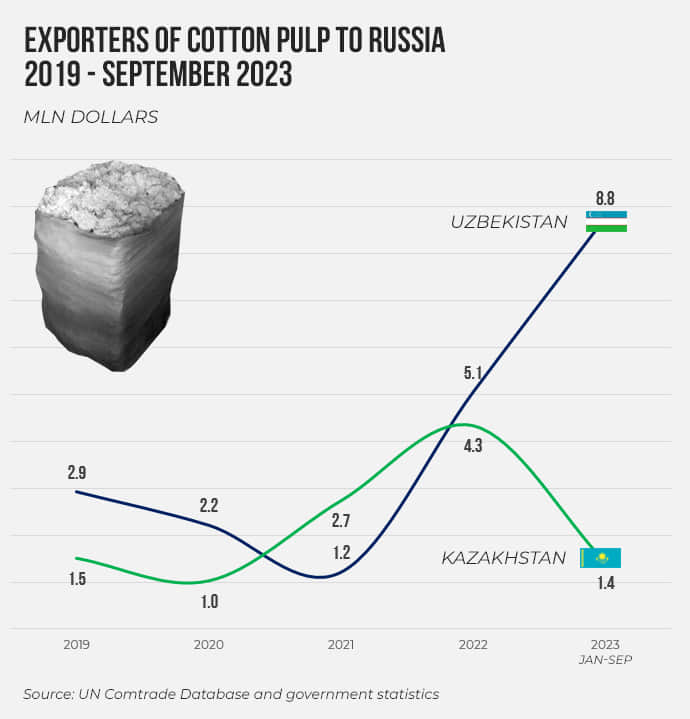
The production of gunpowder and explosives has always been of great importance to the Russian Federation. This issue became especially important during the war. As soon as Russia begins to lose its artillery potential, it loses the captured territories, so the aggressor country is ready to pay any price for the opportunity to have an advantage in shells.
Moscow's problem is that the volume of cotton grown in Russia was not enough to meet the needs of the defense industry even in peacetime, and with the beginning of the invasion of Ukraine, the demand for this raw material increased many times over. At the same time, most of the export channels for such goods were inaccessible due to sanctions.
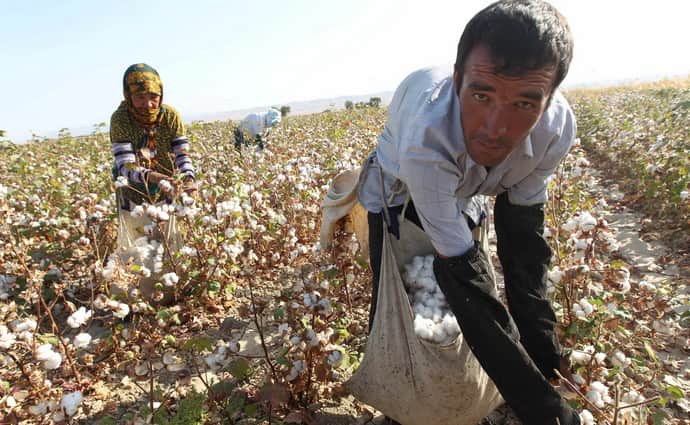
However, this is not the case with Central Asian countries. The idea of involving Uzbekistan and Kazakhstan in imports is not new, as these countries have been supplying materials to Russian military plants since the Soviet era.
Cotton is the main component for the production of nitrocellulose, which is used to make smokeless gunpowder. Local TV channels have shown how the pulp production process takes place in Kazakhstan..
Nitrocellulose is also a component of civilian products such as varnishes and paints. This fact was used by Central Asian exporters to circumvent sanctions.
It was only in June 2023 that the European Union labeled cotton as subject to export controls due to its potential military use. It seems that some countries are not implementing this control in good faith.
How cotton gets to Russia
Most of the cotton pulp in Kazakhstan and Uzbekistan was purchased by local private importers. Subsequently, they sold it through Russian intermediaries to sanctioned state-owned factories in Russia that produce explosives.
An analysis of the transactions shows that at least two Uzbek exporters worked with Russian military-industrial complex enterprises. Documents from the Federal Tax Service of the Russian Federation confirm that at least three Russian companies - Bina Group, Khimtrade, and Lenakhim - sold imported cotton pulp to military plants in Russia.
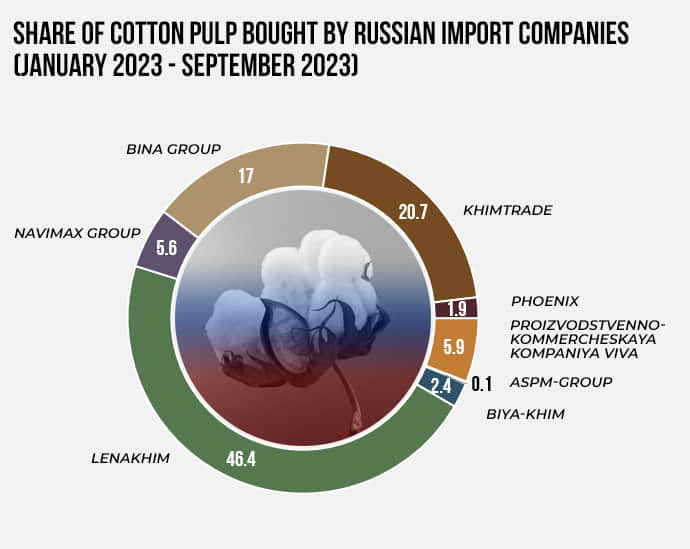
One of their main suppliers was the Uzbek Fergana chemical plant, owned by Russians Mikhail Glukhov and Rustam Muminov. According to ImportGenius, in 2022-2023, the plant supplied raw materials not only to intermediaries in Russia, but also to gunpowder plants in Kazan and Perm worth $2.2 million.
There is also a large Uzbek exporter Raw Materials Cellulose, which cooperates with gunpowder producers, in particular in the Russian Federation. In 2022, this company made 14 direct deliveries to the Tambov Gunpowder Plant for almost half a million dollars. In 2023, its exports increased to $2.6 million.
Other Uzbek companies are also suspected of exporting cotton pulp to the Russian military-industrial complex. Among them are Baxtteksfarm LLC, Fargona is Good LLC, JV LLC Akaltin Logistics Center by Order Omega Logistics DWC LLC, Kubat Impex LLC, and SZ LLC Akaltin Logistics Center by Order Omega Sonix Trade FZ LLC.
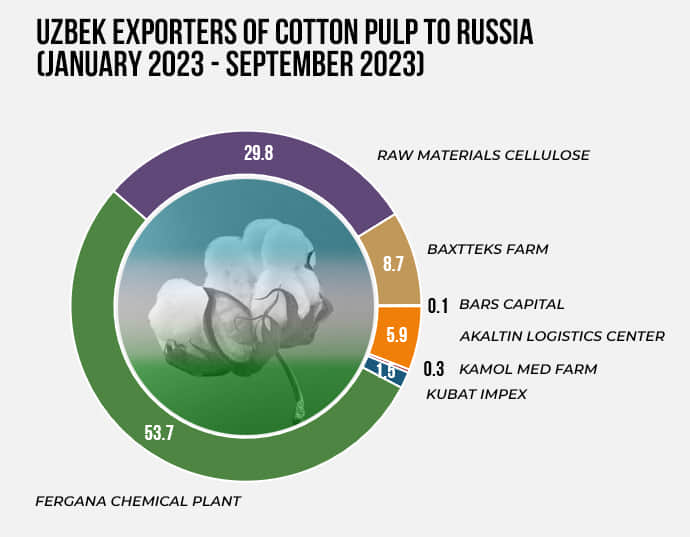
Most exporters from Kazakhstan and Uzbekistan declined to comment. Two companies said that Russian companies use their products to produce varnishes and paints, not gunpowder. Kazakhstan's Foreign Ministry, Ministry of Trade and Ministry of Industry responded in the same way: the supply of cotton pulp to Russian gunpowder plants is not within their competence.
The fact is that cotton pulp in Kazakhstan is not subject to export control. That is, there is no one in the country willing to take responsibility for the export of explosive components, although 46% of this product was received by Russia from the Kazakhs in 2022. The Uzbek Foreign Ministry ignored inquiries about the situation.
To whom the cotton is supplied
The Russian company Lenakhim confirmed to the OCCRP that it purchased cotton pulp from the Fergana chemical plant and Raw Materials Cellulose and resold it to Russian companies. However, its representatives stated that they did not have information on how the latter use the purchased raw materials.
It is difficult to track its end use. After the outbreak of full-scale war, Russian gunpowder plants stopped publishing procurement data and production reports, claiming state secrecy. However, an analysis of the contracts signed before February 2022 and shortly after the invasion of Ukraine allows us to draw conclusions about the purchase of pulp raw materials for defense purposes.
According to the OCCRP, there is a one-year contract from 2021 for the Perm Gunpowder Plant to purchase cotton pulp from the Fergana chemical plant for the production of ballistite (a component of smokeless gunpowder and rocket fuel).
Representatives of the Uzbek plant convinced the OCCRP that their pulp was only suitable for the production of nitro varnishes. The plant denies direct contacts with Russian gunpowder plants, citing strict control by the Uzbek government and banks in the context of possible sanctions.
Read also: Both yours and ours. Everyone but Ukraine will benefit from the seizure of Russian assets
In Kazakhstan, the main producer of cotton pulp is Khlopkoprom. Judging by a number of agreements, its products have also been supplied to gunpowder producers in Russia since 2022. There are contracts for the supply of raw materials to the Kazan Gunpowder Plant from Kazakhstan until 2026, and to the Alexinsky Chemical Plant (which also produces gunpowder) until 2024. Who are the main recipients of pulp cotton in Russia?
The Kazan Powder Plant is a strategic defense-industrial enterprise that produces gunpowder and charges for small arms, aviation, naval, artillery, tank weapons and close combat systems. After the outbreak of the Great War, the plant increased its production of cellulose nitrates and gunpowder.
Every year, the company produces almost 70% of the total Russian volume of gunpowder and shells. It is under US and Ukrainian sanctions.
The Tambov Gunpowder Plant is a defense-industrial enterprise that produces ammunition and specialty chemicals. The plant produces pyroxylene powder and propellant charges for small arms, aviation, naval, artillery, and tank weapons of all calibers used by the Army, Air Force, and Navy.
It is the main supplier of armor-piercing sub-caliber shells for tanks. It is known that the plant plans to double the number of employees by 2025 to almost 5,000. It is under US and Ukrainian sanctions.
The Perm Powder Plant is an enterprise involved in the production of Topol-M and Bulava intercontinental ballistic missiles and Kornet ATGMs.
The plant produces charges for Grad and Smerch multiple launch rocket systems, air defense systems, charges for engines of suspended air-to-air missiles, launch stages of sea-launched cruise missiles, and air-to-surface anti-ship systems. The company is under Ukrainian sanctions.
Instead of a conclusion
Unlike civilized countries that have joined the sanctions against Russia, Kazakhstan and Uzbekistan are helping the aggressor country kill Ukrainians. The scheme is well-established: Kazakh and Uzbek factories produce nitrocellulose, which is bought in Russia by front companies allegedly for the production of varnishes and transferred to Russian gunpowder factories, which turn it into explosives.
The chain may be longer. According to the ExportGenius resource, the Uzbek company Raw Materials Cellulose LLC supplied $206.6 thousand worth of cotton pulp from September 1, 2022, to August 31, 2023, to the Iranian company Benolmellai Pardisan r.shargh, which produces explosives and sells them to the Russian Federation.
Read also: Ukraine can produce much more weapons. What is needed for this?
The study of materials on cotton exports to the Russian Federation also revealed that the Chinese company Hubei Jinhanjiang Refined Cotton cp. ltd. supplied pulp to the Kazan Gunpowder Plant. Presumably, it also "does not know" what exactly pulp cotton will turn into in a place where only gunpowder is produced.
Eric Woods, an export control specialist at the James Martin Center, believes that by using such schemes, the companies in question risk being subject to secondary sanctions. Until this happens, thousands of tons of Central Asian cotton will be turned into gunpowder to kill Ukrainians.
Solving this problem requires not only the involvement of sanctions regulators, but also the attention of Ukrainian diplomats. They must convince representatives of Kazakhstan and Uzbekistan of the need to closely monitor the export of cotton products and the inadmissibility of cooperation with a terrorist state, especially in the context of creating tools for criminal warfare.
Anton Shvets, a soldier, blogger, and economic expert
The author used data published by OCCRP journalists.